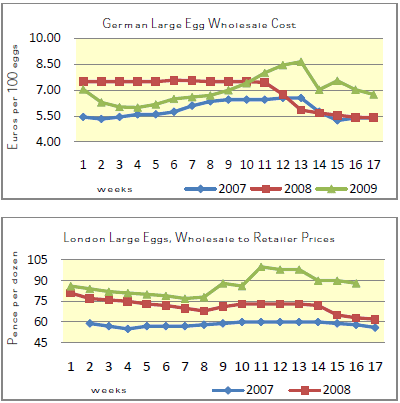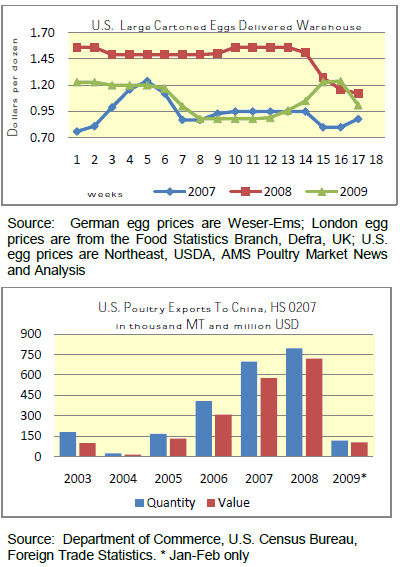



International Egg and Poultry Review
GLOBAL - By the USDA's Agricultural Marketing Service (AMS). This is a weekly report looking at international developments concerning the poultry industry. This week's report is about the poultry situation in Brazil and China.Brazil Approves Integrated Drawback Tax Suspension
Brazilian exports will become more competitive due to the suspension of taxes on inputs used in the production of exported industrial and agricultural products. On 2 April 2009 the Secretariat of Foreign Trade (Secex) Ministry of Development, Industry and Foreign Trade (MDIC), together with the Secretariat of Federal Revenue in Brazil, published the Joint Order RFB/SECEX paragraph 1, of 1 April 2009, in the Official Gazette of the Union. This created the Integrated Drawback, which takes effect 45 days after the day of publication.
Under the new program exporting firms will no longer have to pay Brazil’s 5 per cent IPI excise tax, 5 per cent PIS social tax and 7.6 per cent COFINS social tax on purchases of inputs that will be used in the manufacture of exported products. The exporter can import the input and/or buy the input on the domestic market. There will be no restriction on the type of input purchased as long as the final product is exported.
The drawback was originally for the manufacturing industry, but the agricultural industry was included due to the low cash availability and general financial problems facing some agricultural companies, especially meat processors. The benefit will be mostly to products that use corn, soybeans, feed, drugs and packing and other inputs of the production process, such as poultry, pigs, milk, fruit and cotton.
The drawback was originally for the manufacturing industry, but the agricultural industry was included due to the low cash availability and general financial problems facing some agricultural companies, especially meat processors. The benefit will be mostly to products that use corn, soybeans, feed, drugs and packing and other inputs of the production process, such as poultry, pigs, milk, fruit and cotton.
Source: Brazil Ministry of Development, Industry and Foreign Trade; Brazilian-American Chamber of Commerce, Inc; USDA/FAS GAIN Report; various news wires
China Files WTO Complaint against the US on Certain Measures Affecting Imports of Poultry from China
On 17 April 2009 China filed an official complaint with the WTO asking for formal consultations challenging a US ban on Chinese poultry, which officially begins a 60 day consultation period, after which China can ask the WTO to launch a formal investigation. This was in response to a provision in the US spending bill that specifically prohibits USDA from spending money for rulemaking to allow cooked chicken imports from China.
China had been voicing concern about this issue for months and on 11 March 2009 the Chinese WTO mission in Geneva voiced plans to file a WTO case challenging the US ban on Chinese poultry imports. The US and China had suspended trade with each other in 2004 due to outbreaks of avian influenza in each country. China resumed imports from the US after a few months but the US maintained its ban on Chinese poultry imports.
In 2008 the EU authorized the importation of poultry meat products from the Province of Shandong in China which had been heat treated. Japan and Switzerland also allow the import of heat treated poultry from China.
Source: World Trade Organization; US Federal Register; Official Journal of the European Union; USDA/FAS Gain Report; news wires


Further Reading
| - | You can view the full report by clicking here. |











